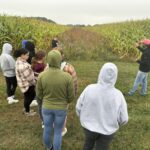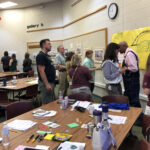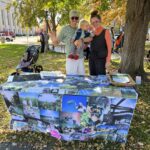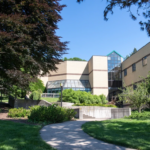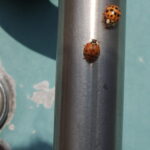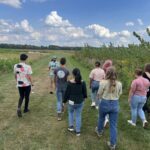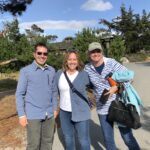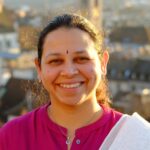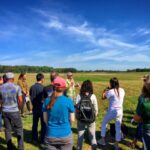BUCHANAN, MI - Buchanan Community Schools proudly announces that Melissa Frost, esteemed educator and dedicated science teacher of Buchanan High School, has been honored as the Michigan Department of Education’s Region 7 Teacher of the Year for the academic year 2024-2025. The Teacher of the Year program, organized by the Michigan Department of Education, aims to recognize and celebrate outstanding educators who demonstrate exemplary dedication to their profession and make significant contributions to the field of education. Melissa Frost exemplifies these qualities through her unwavering
Buchanan students visit KBS LTER and Kellogg Bird Sanctuary with RET Melissa Frost
Throughout 2022 and 2023, Melissa Frost, biology and chemistry teacher at Buchanan High School, joined the KBS LTER through our Research Experience for Teacher (RET) program. The NSF-funded RET program partners teachers with scientists to assist in ongoing research in the lab, as well as providing the teacher the opportunity to develop their own research project. Melissa joined Sarah Evan's lab, and worked with scientists Jennifer Jones and Caitlin Broderick. Melissa embraced the RET as a chance to integrate more research and data into her teaching. "Participating in a RET program allowed
Area educators invited to Kellogg Biological Station K-12 Partnership’s Summer Institute
Hickory Corners, Mich. — Teachers and informal educators of K-12 students are invited to engage in science teaching professional development this summer at the W.K. Kellogg Biological Station. The 24th annual K-12 Partnership Summer Institute is set for 9 a.m. to 3:30 p.m. Tuesday, June 20, through Thursday, June 22. Registration is now open! This year’s theme is “Our Changing Planet, Classrooms to Ecosystems,” and will include scientific talks by Dr. David Karowe, Dr. Lauren Sullivan and Naim Edwards. Each morning’s science talk will be followed by a series of interactive and
DreamScene Placemaking: Artists-in-Residence 2022
Anna Lee Roeder and Erik Vasilauskas are the husband and wife team behind DreamScene Placemaking in Kalamazoo, and our 2022 KBS LTER Artists in Residence. They visited KBS twice during their Residency in 2022. For their first visit in the spring, they stayed with us for a week and toured KBS, visited our long-term experiments, and met with scientists, students, and staff. In the fall, they presented a brownbag seminar on the development of their artistic styles and how the residency fit into that trajectory. As a product of their residency, Anna and Erik engaged the KBS summer
KBS commitment to to fostering an inclusive culture garners accolades from MSU
W.K. Kellogg Biological Station’s dedication to making diversity, equity, inclusion and social justice central to KBS culture has earned an Excellence in Diversity, Equity and Inclusion unit award from Michigan State University. The award focuses on the work of the KBS Culture and Inclusion Committee, or CIC, and its 2022 membership: Among the examples of KBS’s contributions to advancing diversity, equity and inclusion were the formation of the CIC, a focus on diverse hiring and recruitment practices, creation of a DEI advocate position, and the development of programming aimed at
Similar invasive insects coexist through slight differences in environmental responses
Novel analyses of a 31-year dataset on invading ladybeetles shows that small differences in habitat preference across years allow for two similar invading species to coexist while native species decline. Invasive species lead to novel interactions Invasive species are one of the main threats to biodiversity in an increasingly interconnected world. As humans move organisms around, either purposefully or incidentally, new combinations of species have the opportunity to interact with one another. These novel interactions have the potential to affect an invader’s persistence in the
KBS LTER helps prospective biological science grad students envision the field
The second annual Envision EEB event was held Sept. 16-17, 2022, and this year W.K. Kellogg Biological Station hosted a tour that gave a glimpse into life as a grad student in the Ecology, Evolution and Behavior—EEB—program. The Envision EEB: Graduate Preview Weekend provides students from underrepresented backgrounds information on the graduate application process and how to fund their graduate research through grants and fellowships. It also offers an early opportunity to network with potential advisors. About the program The weekend, which was held in person this year after
Building relationships by the ocean
Britney Christensen, Gabe Knowles, and Connie High joined the KBS community through the NSF LTER RET Program (National Science Foundation’s Research Experience for Teachers). This program matches K-12 teachers with local scientists with the goal of enhancing the professional development of K-12 science educators through research experience in order to then bring new knowledge into their classroom. Their experience culminated with a visit to Asilomar, California to attend the LTER Network's All Scientists Meeting in 2022. The following post is written by Britney, Gabe, and Connie, along
Joelyn de Lima: Visiting home
Joelyn de Lima is a recent graduate from MSU, working with Dr. Tammy Long in the Department of Plant Biology. She is currently based in Switzerland, and in spring 2021 was appointed as a virtual visiting scholar with the Kellogg Biological Station Long-Term Ecological Research Program (KBS LTER). Joelyn worked with Kara Haas and the K-12 Partnership team to support and create professional development programming for teachers and Education & Outreach graduate student fellows. To get in touch with Joelyn, you can email her at delimajo@msu.edu or follow her on social media
Improving the sustainability of agricultural systems through educational research: Reflections from an LTER Fellow
Graduate researcher, Craig Kohn, is a dual-Ph.D. candidate with Dr. Andy Anderson in the Curriculum, Instruction, and Teacher Education Department and with the Environmental Science & Policy Program at Michigan State University (MSU). One of the key objectives of K-12 schooling in the United States is to prepare students to make more informed decisions in their personal and professional lives. This is particularly relevant for classroom science instruction. In fact, the need for more informed decision-making was a key motivation for recent widespread reforms in K-12 science

